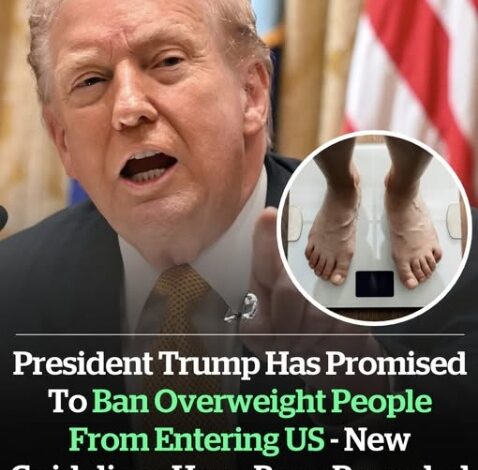Donald Trump has promised to ban overweight people from entering US, new guidelines have been revealed

In a move that surprised many observers, the Donald Trump administration has introduced sweeping new visa guidelines under the U.S. Department of State that allow consular officers to deny visas to applicants based on chronic health conditions such as obesity, diabetes, cancer and mental-health issues. The Washington Post+2Politico+2
At the heart of the changes is a reinterpretation of the “public charge” principle—an immigration law concept that allows denial of entry if someone is likely to become dependent on government support. In this new policy, officials are instructed to ask not just whether an applicant has a communicable disease or lacks vaccination, but whether they might require expensive, long-term care‐and thus become a public financial burden. Wikipedia+2Axios+2
A cable sent to U.S. embassies on November 6 underlines the shift: it states that polices should now consider “certain medical conditions — including, but not limited to, cardiovascular diseases, respiratory diseases, cancers, diabetes, metabolic diseases, neurological diseases, and mental-health conditions — which can require hundreds of thousands of dollars’ worth of care.” Obesity is explicitly listed as a risk factor. Axios+1
What exactly is changing?
Previously, medical screening in visa applications focused primarily on communicable diseases (for example TB, syphilis) and whether an applicant’s condition would create an immediate public-health risk. Wikipedia+1 Under the new guidance, the scope broadens to chronic and non-communicable conditions — ones that do not threaten an immediate outbreak but may entail long-term treatment costs. Conditions such as obesity, high blood pressure, sleep apnea, and dependency on long-term care are now potential reasons for refusal. Politico+1
Among the key questions consular officers are instructed to ask:
- Does the applicant have adequate financial resources to cover future medical treatment and avoid reliance on public assistance? Axios+1
- Do dependents (children, elderly parents) have special medical needs that might affect the applicant’s ability to work or support themselves? Axios
- Is the applicant’s age, medical history or pre-existing condition likely to push them into a lifetime of care at public expense? The Washington Post
Legal and immigration experts are raising alarm bells. They say that consular officers are not trained medical professionals and are being asked to make judgments about future health costs, risk levels and financial lifespans — tasks they are not equipped for. The Washington Post+1 One immigration attorney called the guidance “an unusual and concerning move” because it appears to broaden the criteria far beyond past practice. Axios
The policy shift comes amid a broader immigration crackdown by the Trump administration and is seen by critics as a way to restrict legal immigration further by introducing new discretionary grounds for refusal. According to a spokesperson, this is part of “putting Americans first” and ensuring the immigration system does not impose additional burdens on U.S. taxpayers. Politico
So who is affected?
While the guidance applies to both non-immigrant and immigrant visas theoretically, sources suggest the greatest impact will be on applicants for permanent residency or long-term stay — cases where the “public charge” rule typically plays a larger role. Axios+1 It may also affect family-based applicants, older immigrants, those with chronic medical conditions, and people who do not have strong financial backing or health insurance in place.
What are the implications?
- Applicants with common conditions such as obesity, diabetes, or high blood pressure may find themselves under extra scrutiny.
- Applicants may be required to present detailed financial documentation, proof of insurance, or show ability to pay for care for a lifetime. Axios
- Families may face more hurdles if a dependent has ongoing health needs.
- The policy could discourage some qualified immigration applicants from applying, due to uncertainty about health-based decisions.
What critics say:
Critics argue this policy is both unfair and unworkable. They say it could lead to inconsistent visa decisions based on assumptions rather than medical facts. One attorney warned that because consular officers aren’t medical experts, giving them power to predict someone’s health trajectory “could lead to bias or inaccuracy.” The Washington Post On top of that, they argue it may violate existing State Department procedures, which previously cautioned against speculation about an applicant’s future reliance on public benefits. Axios
What supporters say:
Backers argue that the policy tighter aligns immigration law with fiscal responsibility. They contend that if someone is unlikely to be self-sufficient, has chronic expensive health needs, or lacks financial means to cover care, denying entry makes economic sense. They view it as closing a loophole where immigrants may end up dependent on U.S. public resources. Politico
Looking ahead:
Implementation will be uneven and largely dependent on the discretion of visa officers, meaning applicants may see greater variability in outcomes. Legal observers expect increased litigation, more appeals, and likely further guidance required. Some consular offices may apply the stricter standards faster than others, creating global inconsistencies.
For now, anyone applying for a U.S. visa — especially immigrants or long-stay visitors — may need to prepare for new realities: health declarations, detailed disclosures of chronic conditions, proof of financial reserves and medical coverage, and possibly new evidence of ability to avoid public-benefit dependence.
Bottom line:
The administration is shifting the immigration axis away from criminal or infectious-disease exclusions toward a health-and-financial-risk model. For many applicants this means that personal health history, access to care, and financial resources may matter almost as much as job offers or family ties. It’s a dramatic expansion of visa-screening criteria — and one that many say will have far-reaching consequences.